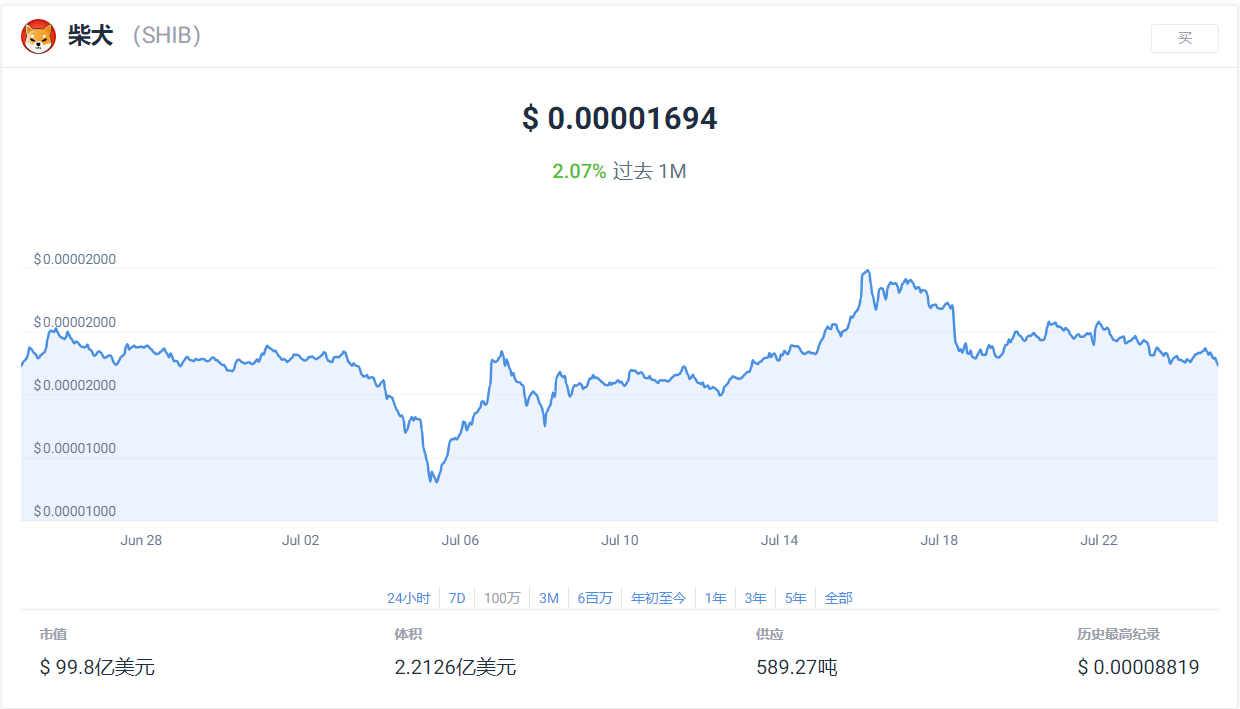Which cryptocurrencies are worth buying right now?
The cryptocurrency market remains volatile, with many investors considering whether to sell now to secure profits or to continue holding or even increase their holdings in order to take advantage of a possible price rebound in the short to medium term.
Although the cryptocurrency market has gradually recovered from the last bear market, every bear market will eliminate some projects. Therefore, it is particularly important to select high-quality crypto projects that are expected to survive the bear market and thrive in the future.
This article analyzes the top 200 cryptocurrencies based on a number of key factors including liquidity, technological innovation, industry leadership, token economics, etc. The detailed criteria will be introduced later in the article.
Through meticulous analysis, we have selected a dozen cryptocurrencies with the most investment value in the market. Our top three lists will be updated weekly based on the latest developments in the encryption and blockchain fields.
List of cryptocurrencies worth investing in July 2024:
- Bitcoin - a decentralized peer-to-peer cryptocurrency
- Toncoin — a blockchain tightly integrated with Telegram messenger
- Cardano — Ethereum’s main competitor
- Maker — A key decentralized finance project
- Ethereum - the leading smart contract platform
- Solana - High-performance smart contract blockchain platform
- Kaspa - A scalable layer-1 blockchain based on BlockDAG architecture
- BNB - the main cryptocurrency used in the Binance ecosystem
- XRP - an efficient digital currency exchange tool
- Uniswap — the largest decentralized exchange (DEX) on Ethereum
- Notcoin — TON blockchain project, inspired by a popular clicker game
- Shiba Inu — The second largest meme coin on the market
Research cryptocurrencies worth investing in right now
We have started by focusing on three cryptocurrency projects that have made significant progress recently or are about to have important events. This information will be updated weekly to reflect the latest developments in the cryptocurrency and blockchain space.
Before we dive into the list of recommended cryptocurrencies, it’s important to emphasize that choosing which cryptocurrency to invest in is only the beginning of your digital currency investment journey. Choosing the right trading platform and storage options thereafter are equally important.
We recommend that after purchasing cryptocurrency on an exchange, the best practice is to transfer it to a hardware wallet for safe storage. KuCoin purchases and Ledger hardware wallet storage are a good start.
1. Bitcoin:
Bitcoin is a decentralized peer-to-peer digital currency that was first proposed in 2008 and began operating in 2009. The founder of Bitcoin is a person with the pseudonym Satoshi Nakamoto, whose true identity has not been revealed to this day.
Bitcoin introduced blockchain technology, providing a completely decentralized and extremely secure payment method. It uses a proof-of-work mechanism, which greatly increases the difficulty of modifying transaction records or making double spend. The network is maintained by miners, who secure the network by adding blocks and receive Bitcoin as a reward.
BTC can be transferred anywhere in the world 24 hours a day without going through any intermediary institutions. Users can independently control their Bitcoin by keeping their own private keys without relying on financial institutions such as banks.
Despite the emergence of countless cryptocurrencies and blockchain platforms, Bitcoin remains one of the largest cryptocurrencies by market capitalization.
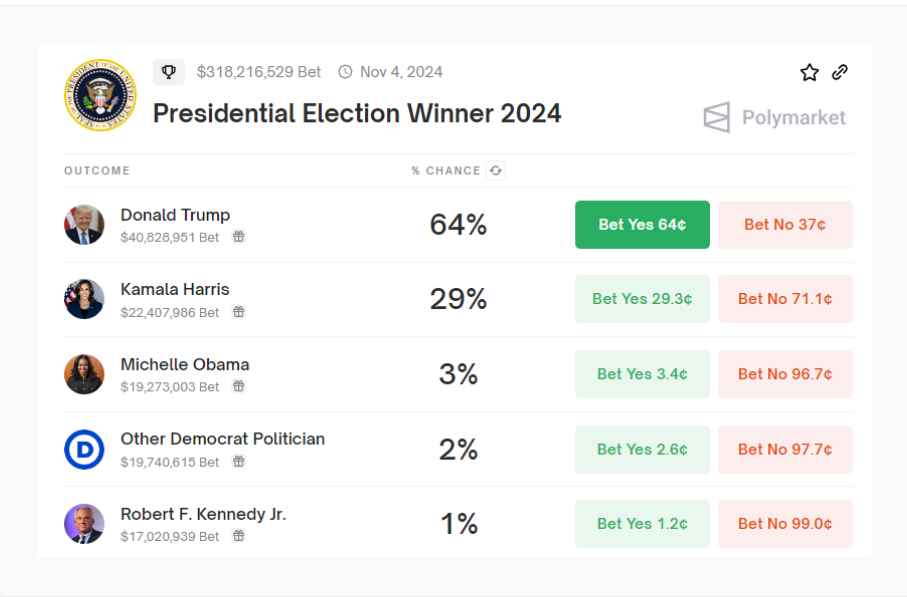
Why Bitcoin?
Bitcoin has gained 22% against the dollar over the past 14 days, leading a broad rally across the cryptocurrency market. The rise in Bitcoin prices has coincided with heightened uncertainty in the U.S. political situation, including an assassination attempt on former President Donald Trump.
Many analysts believe the assassination attempt may have increased Trump's chances of winning the November presidential election, with blockchain prediction market Polymarket showing his odds of winning rising to 71% from about 60% before the incident. After the initial reaction, Trump's chances of winning against contenders including Kamala Harris and Michelle Obama are 64%.
The Bitcoin market has reacted positively to the increased likelihood of Trump becoming the next U.S. president, as Trump has a more friendly attitude toward Bitcoin and other cryptocurrencies than his opponent and incumbent President Joe Biden.
If Trump becomes president, it could mean the end of Gary Gensler’s tenure as chairman of the U.S. Securities and Exchange Commission (SEC), which is good news for the cryptocurrency market. Trump’s successor may be more open to blockchain-based financial products.
Trump said in 2019 that Bitcoin and other cryptocurrencies are "not real money" and are "highly volatile and based on fantasy." But since then, his remarks have taken a more positive direction. In June of this year, Trump wrote on Twitter: "We want all Bitcoin to be made in the USA!!!" and said that "Bitcoin mining may be our last line of defense against central bank digital currencies."
Trump even plans to attend the Bitcoin 2024 conference in Nashville, Tennessee on July 27.
Additionally, Bitcoin spot ETF net flows are increasing, and while daily net flows were mostly negative from the second week of June to the second week of July, we have observed inflows of over $2.8 billion since then. This suggests that institutional investors see buying BTC at current prices as a good investment opportunity. At the time of writing, BTC is trading just 8% below its all-time high.
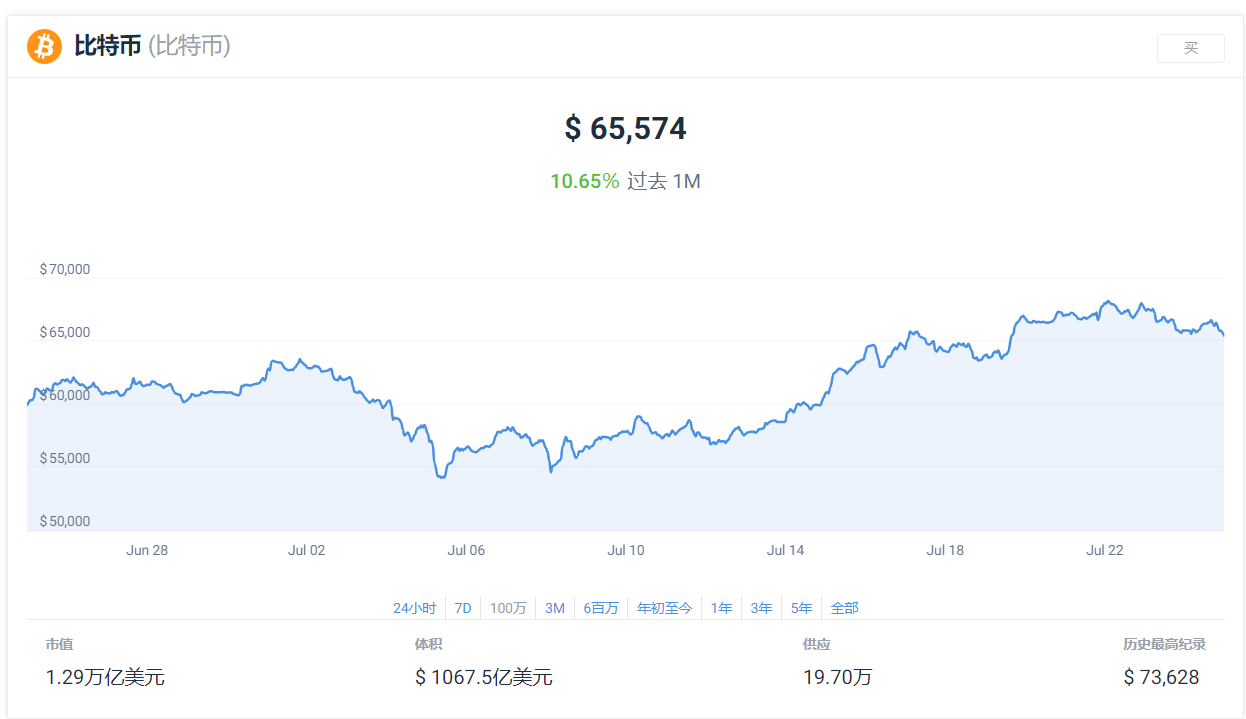
2. Toncoin
Toncoin is a blockchain project that was originally designed by the Telegram team, and although Telegram abandoned the project due to a legal dispute with US securities regulators, community members recognized the potential of the platform and decided to continue development under the name Toncoin.
The development of Toncoin is currently led by the TON Foundation, an organization that has no formal connection with Telegram. It is worth mentioning that Telegram is integrating various functions supported by the Toncoin blockchain into its communication services, such as the Telegram application now integrates the TON Space wallet.
Technically, Toncoin is a scalable blockchain with smart contract functions and a proof-of-stake consensus mechanism. Its initial token issuance uses a proof-of-work mechanism to ensure fairness.
Why Toncoin?
On July 19, Telegram founder Paul Durov announced that Telegram will launch a built-in decentralized application store and Web3 browser, and emphasized the fight against scams targeting blockchain novices.
According to DeFi Llama, Toncoin is one of the fastest growing blockchain ecosystems in the world, with a total locked value (TVL) of $768 million, up from just $13 million at the beginning of the year. The main drivers of this significant growth include Telegram's broad user base and its deep integration with the open network, as well as the various incentives introduced by the team in recent months.
Additionally, the upcoming airdrop of Hamster Kombat, a globally popular game that has attracted more than 250 million users since March, is expected to further boost growth. This integration and the upcoming issuance of the native token are expected to drive TON prices further up.
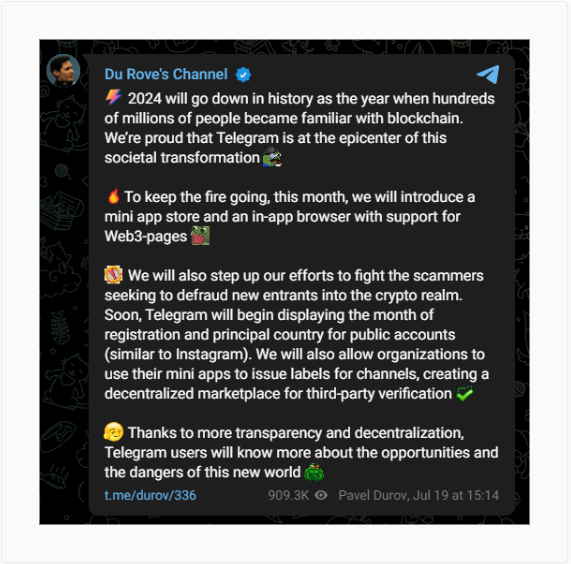
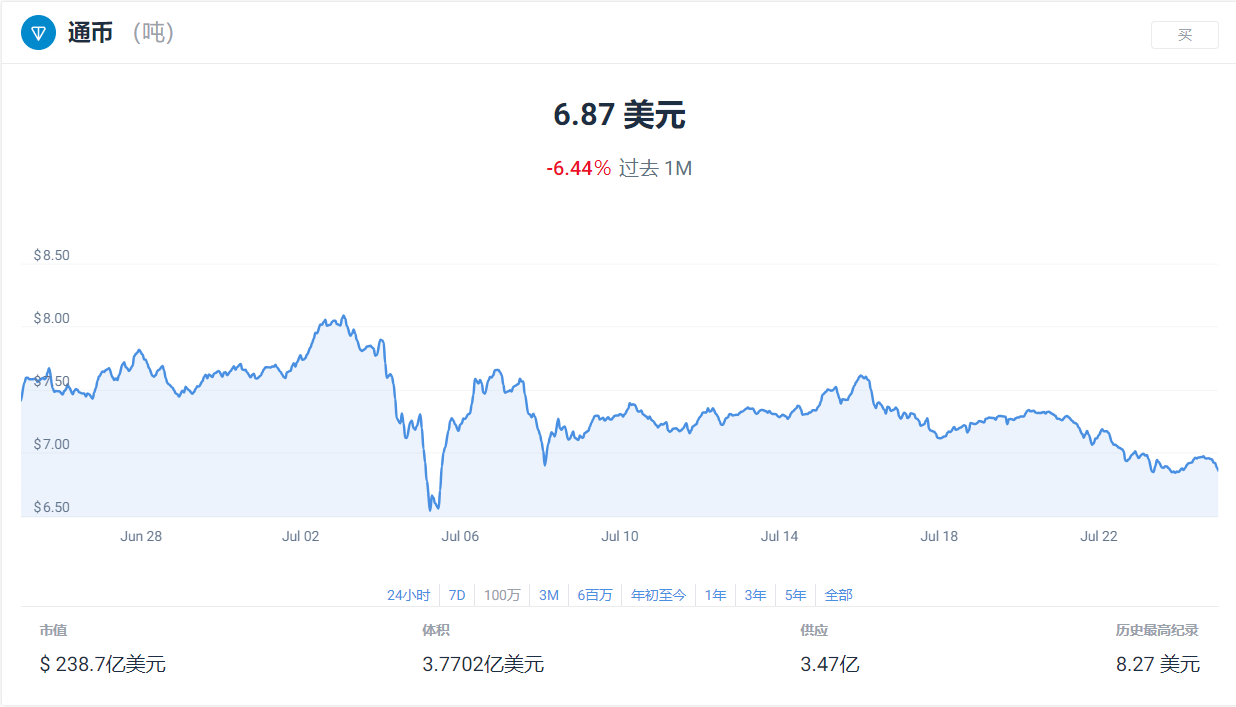
3. Cardano
Cardano is a decentralized blockchain platform founded by Ethereum co-founder Charles Hoskinson, which aims to provide a more secure and scalable infrastructure for smart contracts and decentralized applications (dApps). The platform was launched in 2017 and uses a unique proof-of-stake consensus mechanism called Ouroboros, which is more energy-efficient and secure than the traditional proof-of-work system.
Cardano's native cryptocurrency ADA is used to support transactions and operations within the network. The platform's development is based on academic research and peer review, striving to build a scientific and rigorous blockchain ecosystem. Its layered architecture separates account value and transaction reasons, improving the flexibility and security of the system.
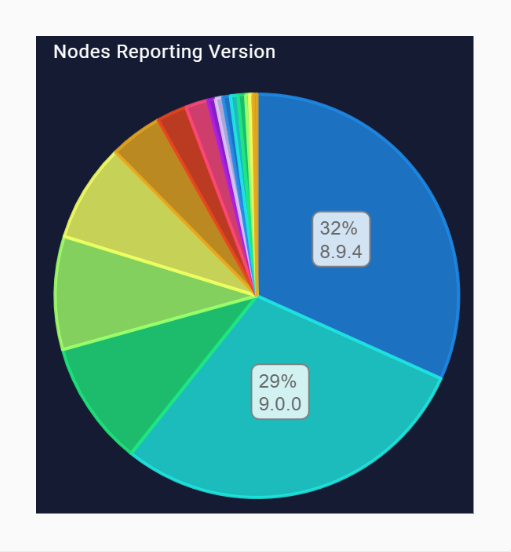
Why Cardano?
Earlier this month, Cardano released an update to its validator node software Node 9.0 in preparation for the upcoming Chang hard fork. This update is seen as a major improvement that will introduce a decentralized governance mechanism. Currently, 29% of the nodes have been upgraded to the new version, demonstrating an important step towards wider adoption.
Additionally, Cardano’s price has been strong in recent times, with ADA up 26% between July 8 and 16, indicating potential growth potential.
4. Maker
Maker is a decentralized financial protocol running on Ethereum that manages the decentralized stablecoin Dai pegged to the US dollar. Users can use assets such as ETH as collateral and lock these assets in Maker's smart contract to mint Dai.
The Maker system requires that the value of the collateral exceeds the value of the minted Dai, and users need to monitor the value of the collateral at all times to avoid liquidation. The MKR token is the governance token of MakerDAO, a decentralized autonomous organization that oversees the Maker protocol.
Why choose Maker?
MakerDAO recently announced the Spark Tokenization Grand Prix, an open competition to invest $1 billion in tokenized real-world assets (RWA) through the Maker platform. Multiple major asset managers have lined up to participate, demonstrating broad support and trust in the Maker platform.
5. Ethereum
Ethereum is a blockchain platform that supports smart contracts, allowing developers to build complex applications such as decentralized lending protocols and non-fungible tokens (NFTs). The project was proposed by Vitalik Buterin in late 2013 and officially launched in July 2015.
One of Ethereum’s first applications was to support the issuance of custom tokens that could be traded on the Ethereum blockchain. Several projects have successfully raised funds through Initial Coin Offerings (ICOs) and other token sales.
Currently, Ethereum has an active decentralized application (DApp) ecosystem covering decentralized finance (DeFi), NFT markets, publishing platforms, and decentralized exchanges, making it a high-quality investment option in 2023.
ETH is the native asset of the Ethereum blockchain, which incentivizes users to maintain network security. Initially, Ethereum used the Proof of Work (PoW) mechanism, and then switched to the more environmentally friendly Proof of Stake (PoS) in September 2022.
Why Ethereum?
With the Ethereum ETF expected to be listed in the U.S. market soon, ETH has undoubtedly become one of the most watched crypto assets in the short term. After the U.S. Securities and Exchange Commission (SEC) approved the 19b-4 filing for the relevant Ethereum ETF, the price of ETH once soared to about $3,900. Although it has fallen back since then, once the ETF actually starts trading, it is expected to trigger bullish activity in the ETH market again.
Considering the market reaction when the first Bitcoin spot ETFs began trading in the United States earlier this year, the price of BTC soared from about $45,000 to a record high of more than $73,600. Although it is difficult to predict the specific impact that the Ethereum spot ETF will have on ETH, the market is generally optimistic about it. According to the latest news from Bloomberg analysts, the SEC may approve the listing of the Ethereum spot ETF on July 15.
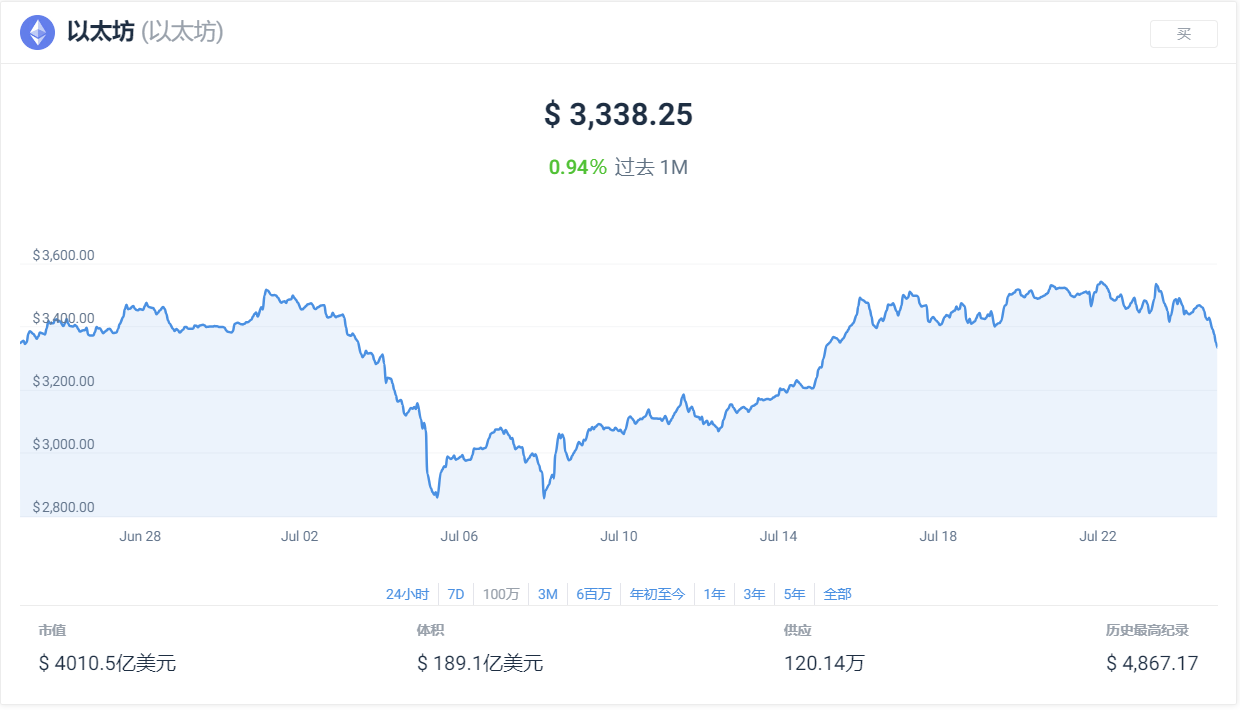
6. Solana
Solana is a smart contract platform known for its unique architecture that can process thousands of transactions per second at a very low cost. Solana achieves this by combining a unique historical proof algorithm and a proof-of-stake consensus mechanism. As a cryptocurrency, SOL is favored by the market for its low transaction costs (less than $0.001 per transaction on average).
Solana was founded by Anatoly Yakovenko in 2018, with the mainnet launched in March 2020 and gaining widespread adoption in 2021. Despite a decline in value during the bear market in 2022, Solana remains one of the most compelling ecosystems in the cryptocurrency space, and its potential cannot be underestimated.
Why Solana?
Asset management companies VanEck and 21Shares have applied to launch spot Solana ETFs in the United States, both seeking to be listed on the CBOE BZX exchange. 21Shares plans to use Coinbase as the SOL custodian of its fund, with funds stored in independent wallets on the Solana blockchain. It is worth noting that the fund will not pledge SOL due to regulatory requirements.
Outside the United States, 21Shares has launched an exchange-traded product (ETP) that is 100% physically backed by SOL, allowing holders to receive staking returns. The product is traded on the Swiss Stock Exchange, Stuttgart Stock Exchange and Amsterdam Stock Exchange.
Although there are now active Solana ETF applications, the path to a Solana ETF may be more complicated than the recently approved Ethereum ETF. It is important to note that the US securities regulator SEC has claimed in at least two lawsuits that SOL is an unregistered security, and unlike Bitcoin and Ethereum, there is currently no regulated Solana futures market in the United States.
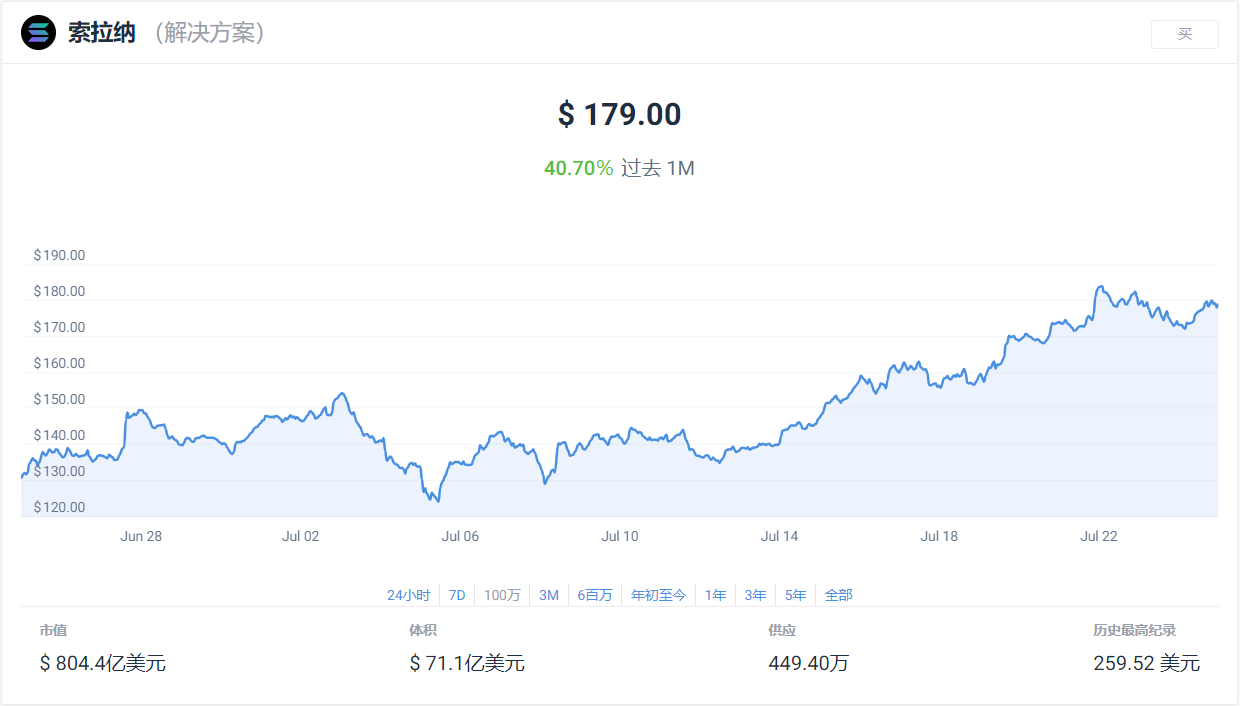
7. Kaspa
Kaspa is a decentralized cryptocurrency project focused on high scalability and fast transactions. Kaspa uses block DAG instead of traditional blockchain technology, and is committed to fast block confirmation to provide a more efficient and user-friendly experience. This first-layer blockchain combines proof of work (PoW) with directed acyclic graph (DAG) to optimize the finality of blocks, making the Kaspa network superior to other PoW chains in terms of energy consumption and transaction processing efficiency.
Why choose Kaspa?
Kaspa had an excellent last week, gaining 19.5% against the dollar. The main driver of this growth was the announcement by crypto mining company Marathon Digital that it has been mining Kaspa since September 2023. The company has acquired 60 petahashes worth of Kaspa mining hardware (Bitmain's KS3, KS5, and KS5 Pro miners), although only half of it is currently running. The company expects that once all mining hardware is deployed, it will have 16% of the global Kaspa hashrate.
Adam Swick, Chief Growth Officer at Marathon Digital, said: “Kaspa’s technological innovation and active community allow us to diversify our revenue streams and increase profitability per kWh. While Bitcoin has its own unique value, Kaspa’s innovative technology provides us with a valuable opportunity to support and foster innovation in proof-of-work.”
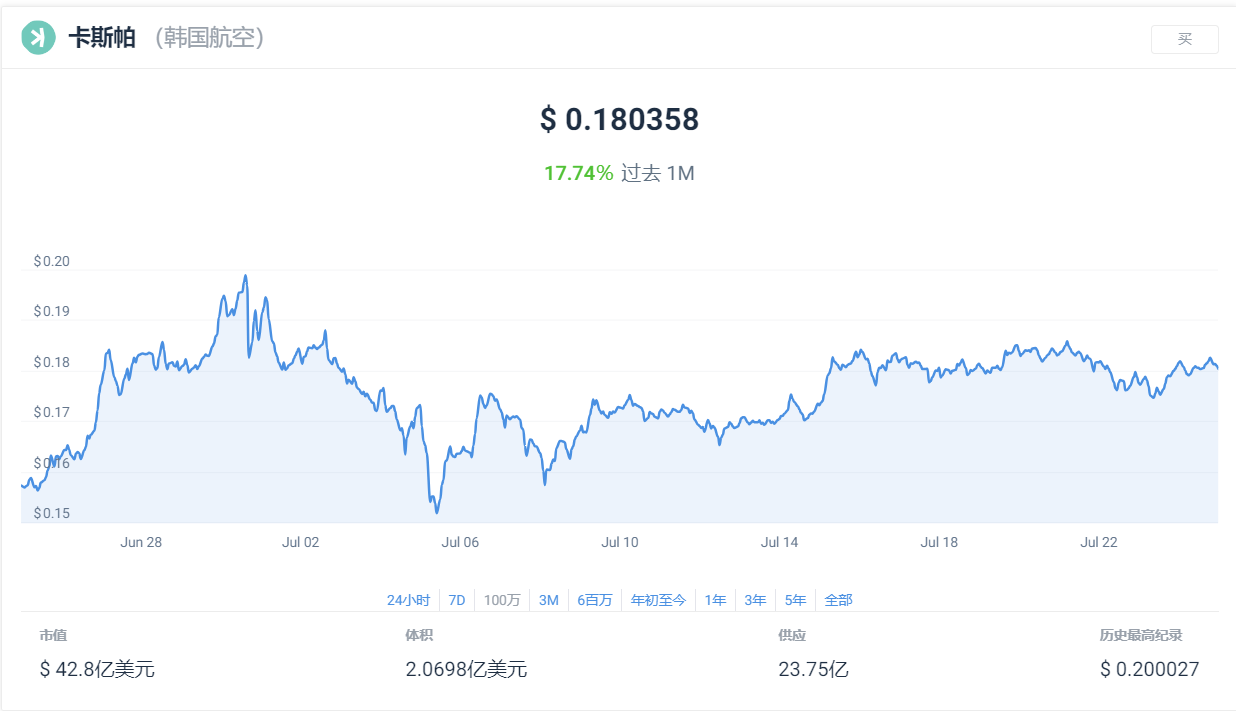
8. BNB
BNB is a token launched by the Binance cryptocurrency exchange in 2017. The token has two main uses: first, holders can enjoy a series of benefits when using the Binance exchange, including reduced transaction fees, priority participation in Launchpad and Launchpool projects, and cash back when using the Binance Visa card; second, BNB is the native asset of the BNB Chain blockchain. On this platform based on an Ethereum variant, not only does it have low transaction fees, but it also allows developers to easily deploy decentralized applications compatible with the Ethereum Virtual Machine (EVM). Formerly known as Binance Coin, BNB has undergone extensive rebranding in recent years.
Why choose BNB?
Binance recently launched a new program called "HODLer Airdrops" to reward users who hold BNB in its Simple Earn product. Binance said that it will airdrop tokens of projects that are about to be listed and have a large circulating supply through HODLer Airdrops. Binance promises that these projects will be small and medium-sized projects with sound foundations and active communities. In addition, BNB holders who participate in Simple Earn can not only receive airdrops, but also enjoy other benefits of Launchpool, Megadrop program and Binance VIP program.
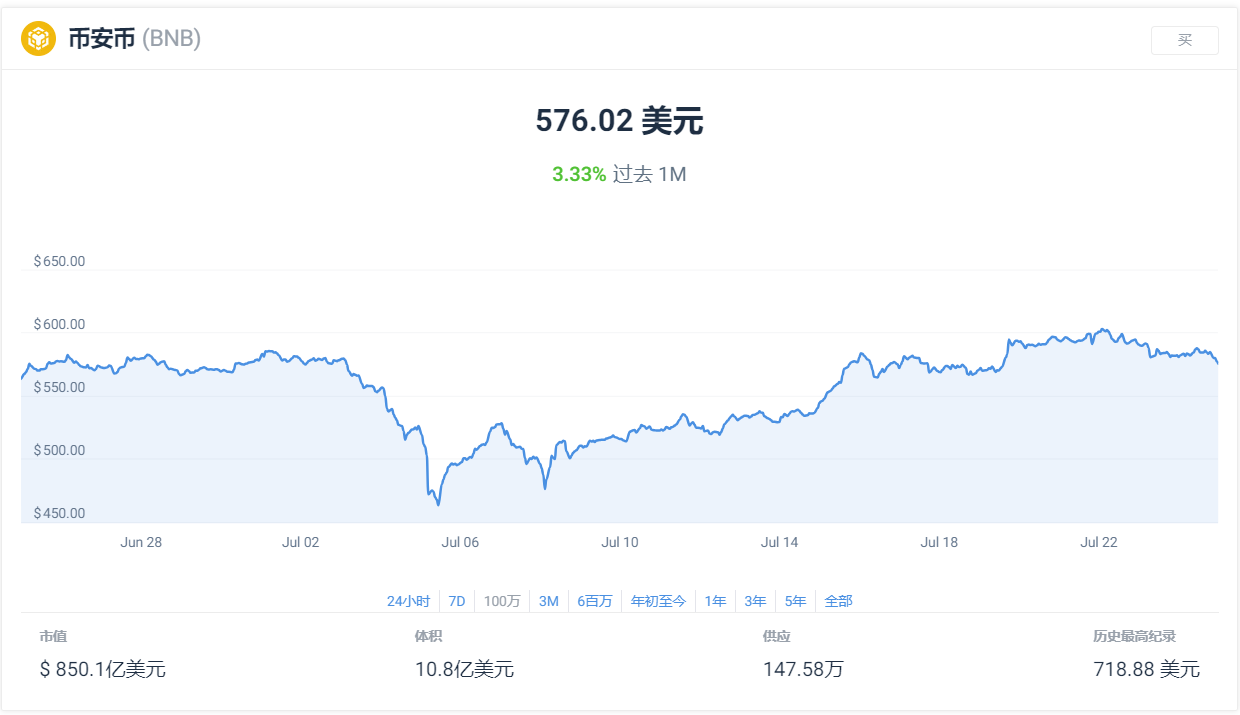
9. XRP
XRP is a cryptocurrency launched in June 2012 and developed by David Schwartz, Jed McCaleb and Arthur Britto, who co-founded OpenCoin with Chris Larsen. Initially, 80% of the XRP supply was gifted to OpenCoin, which later changed its name to Ripple and held the majority of its XRP in escrow.
XRP provides extremely fast transfer speeds and low costs, making it particularly suitable for scenarios such as international remittances. Unlike systems that use proof of work or proof of stake, XRP implements the XRP Ledger Consensus Protocol, where each participant in the network can choose a group of validators they trust to maintain the security and stability of the network.
Ripple has added XRP to several of its products, most notably its On-Demand Liquidity (ODL) service, working with cryptocurrency exchanges to use XRP to make cross-border remittances more efficient.
Why XRP?
As a core member of the XRP Ledger ecosystem, Ripple recently announced that it will launch a stablecoin pegged to the US dollar on the XRP Ledger and Ethereum platforms. This stablecoin will adopt the traditional full-backed model, backed by US dollar deposits, short-term US Treasury bonds and other cash equivalents. In order to improve transparency, Ripple plans to publish audit certificates from third-party accounting firms every month to verify the full backing of the stablecoin. This move is expected to greatly enhance the liquidity of the XRP Ledger and may bring new growth momentum to XRP.
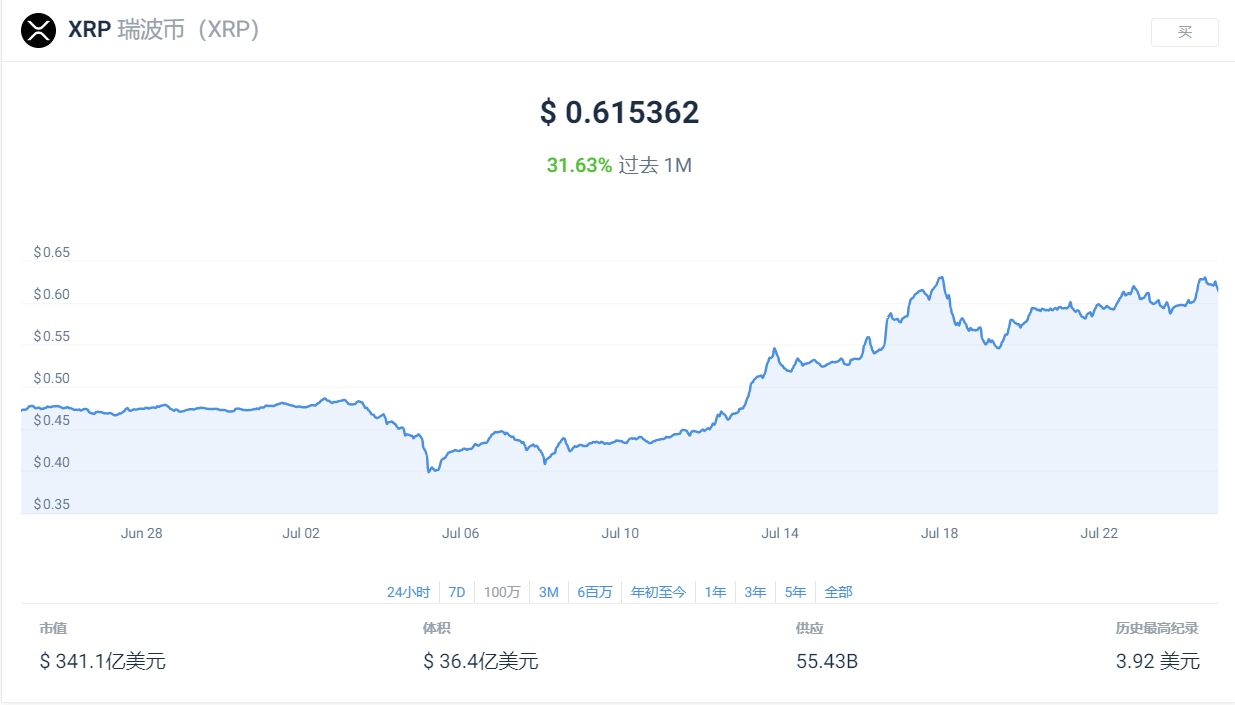
10. Uniswap
Uniswap is a decentralized cryptocurrency exchange that promotes the automated market maker (AMM) model. This innovative design allows different tokens to be exchanged directly on the blockchain without relying on traditional order books, greatly simplifying the trading process.
The Uniswap protocol is completely decentralized, and anyone can create a liquidity pool for tokens, which often allows new crypto assets to be traded on Uniswap before entering traditional cryptocurrency exchanges. In addition, Uniswap is also one of the decentralized exchanges with the largest trading volume.
UNI tokens are held by users of the Uniswap protocol, who can submit and vote on protocol proposals. UNI was initially airdropped to early users of Uniswap, and the token is now available for trading on multiple decentralized and centralized exchanges.
Why Uniswap?
The UNI token has performed well in the past week, with the price rising by 12% to a multi-week high. At the same time, most cryptocurrencies in the market are depreciating. On-chain data shows that the growth of UNI open interest is consistent with the market trend, showing the growing interest of investors in UNI. In addition, Uniswap recently supported ZKsync, allowing its users to trade on the efficient Ethereum second-layer network, which will bring lower fees and faster transaction times to Uniswap, which may promote positive perceptions of UNI.
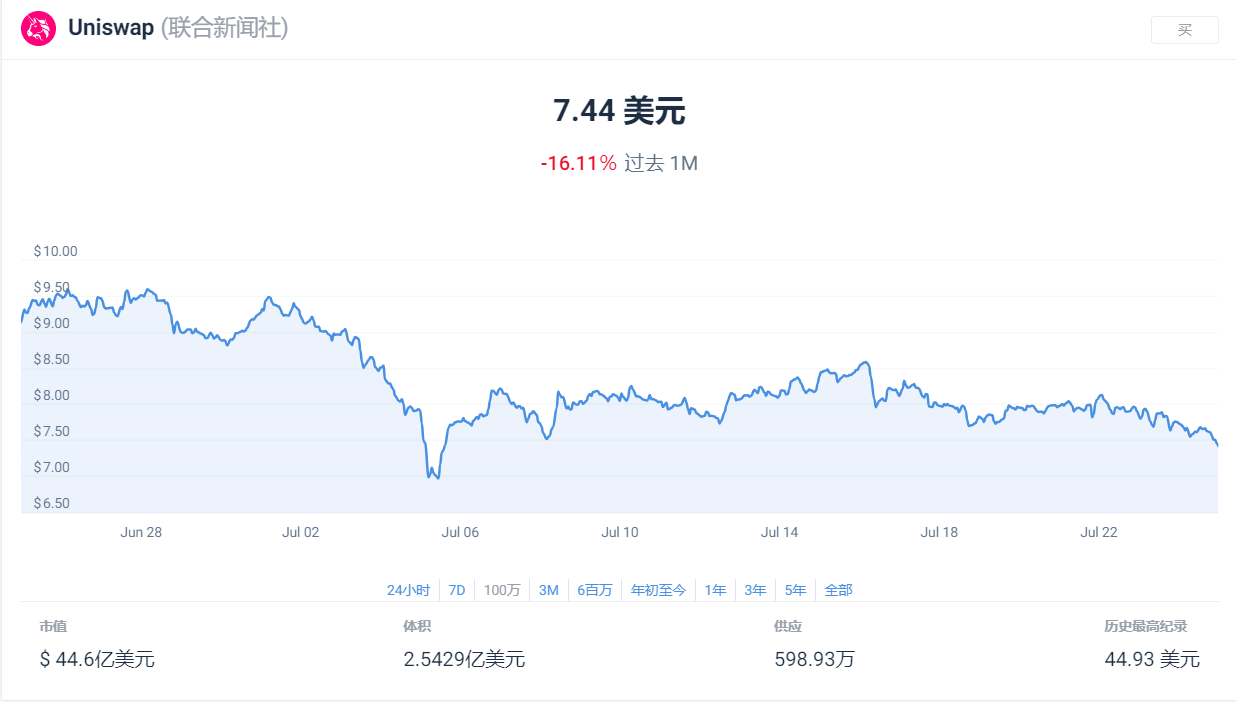
11. Notcoin
Notcoin first appeared in the form of a simple clicker game in the Telegram messaging program. By repeatedly clicking on a shiny coin image, players can earn points and activate rewards to increase the speed of earning points. The Notcoin Mini App also has basic social functions. Users can create "squads" and compete with other teams on the leaderboard. These features helped Notcoin quickly gain the attention of millions of users.
Currently, the Notcoin team has launched a real token on the TON blockchain platform, codenamed NOT. This token is intended to serve as a community token that rewards users for their activities when exploring the web3 ecosystem, participating in games, or contributing value to the ecosystem.
Why Notcoin?
Notcoin has partnered with DeFi project 1inch and on-chain certification project Sign to provide startup acceleration services for teams on the TON blockchain, called Triangle. This accelerator supports teams that are committed to improving the TON user experience and creating applications that bridge the gap between web2 and web3. Participants will be supported with market entry services, investment and guidance, and will have access to the TokenTable token management platform and Sign Protocol to prevent misconduct. In addition, 1inch will provide support for DeFi integration. The first batch of members of the accelerator includes several industry heavyweights, which indicates the development potential of Notcoin.
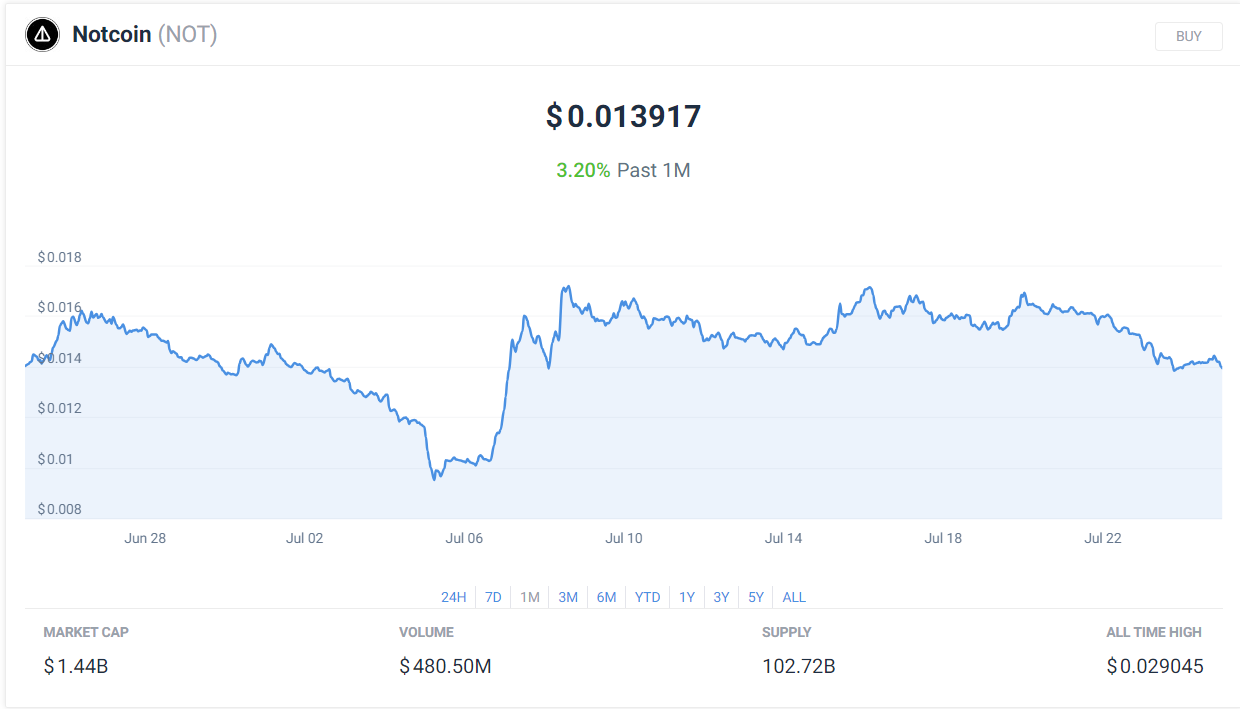
12. Shiba Inu
Shiba Inu is a meme-based cryptocurrency created in 2020 by a developer who goes by the pseudonym "Ryoshi". The project is heavily inspired by Dogecoin and uses the Shiba Inu dog breed as its brand image. Unlike Dogecoin, which has its own blockchain, Shiba Inu is issued as an ERC-20 token on the Ethereum blockchain.
In the initial distribution of SHIB tokens, half of the supply was transferred to Ethereum founder Vitalik Buterin, although he had nothing to do with the project. This action was seen by the project as a token burning initiative. Buterin subsequently destroyed most of his SHIB holdings and sold the remaining tokens, with the proceeds used for charitable donations.
In 2021, SHIB's popularity has risen sharply, and its market capitalization has become the second largest meme coin, second only to Dogecoin. In addition, SHIB is also one of the most popular low-priced cryptocurrencies currently.
Why Choose Shiba Inu?
The Shiba Inu project raised $12 million by issuing TREAT tokens. The funds were provided by several international venture capital firms including Mechanism Capital and Big Brain Holdings.
The TREAT token is designed to be the last newly introduced token in the Shiba Inu ecosystem and is intended to serve as a utility and governance token for the new blockchain, improving the privacy of blockchain transactions.
The ecosystem’s new blockchain will use fully homomorphic encryption (FHE) technology developed by Zama and is planned to run as a third-layer blockchain on top of the Shibarium platform.
Shytoshi Kusama, lead developer of the Shiba Inu project, said of the funding:
“We are very excited to have such strong VC support, angel investors and brands working together to advance this ambitious decentralized project. These VC partners and their strategic collaboration add credibility to our network and significantly enhance the contribution that Shiba Inu can truly make to our community ‘ShibArmy’.”
